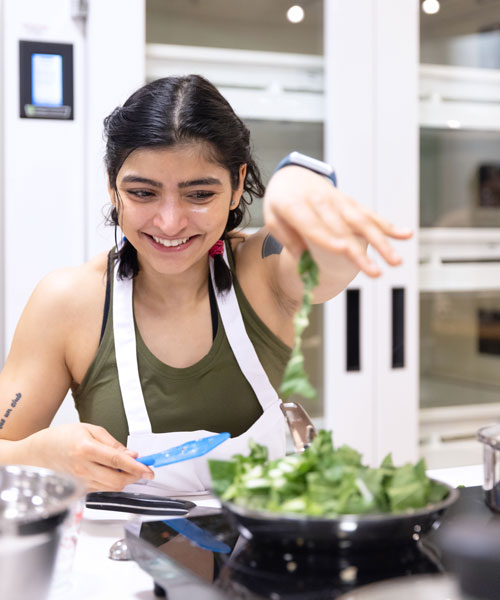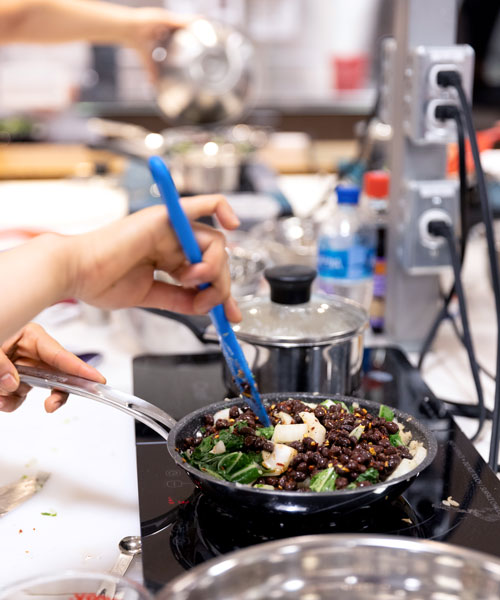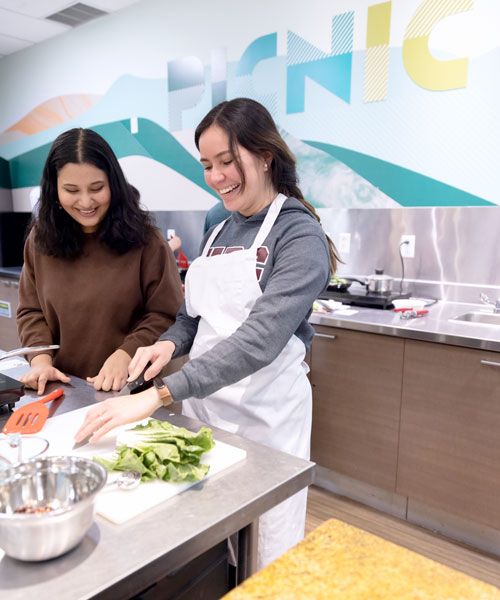
FOOD. AT ITS CORE, IT’S PHYSICAL SUSTENANCE FOR LIFE—a source of nutrients to keep our bodies moving and functioning. But unlike the rest of the animal kingdom, the human relationship to food is wholly unique. It’s more than just fuel; food nourishes our mental wellness, strengthens our emotional bond to others, represents culture and heritage, makes memories and connects us.
Now imagine not having access to sufficient food to meet your basic daily needs. “Numbers coming out of universities across Canada, including UBCO, illustrate food insecurity is a reality,” says Casey Hamilton, a registered dietitian and Wellbeing Strategist at UBC Okanagan.
“Food insecure individuals are more likely to drop classes, or out of school completely. They’re more likely to have mental health and physical concerns, which impacts their grades and their ability to be in school; it impacts their mental and physical health as well as their social wellbeing.
“Imagine not having $5 to go for a coffee with your friends; that can be socially isolating and becomes a really demoralizing way of living.”
At the same time, the Student Wellness team’s own research found that students wanted to learn about food and nutrition in a way that would encourage community and social connection through food. Taken together, this information spurred the team to ask: how could the university better support students looking to eat, learn, build community and improve their health literacy?
The result is Picnic, located in the University Centre. A first-of-its-kind space on a university campus for food and community wellness activities, Picnic is funded in partnership with UBCO’s Student Union and a donation from the KGH Foundation Kiwanis Legacy Fund.
According to Hamilton, Picnic is more than just a place to get food; it’s about bringing people together and providing greater opportunities to improve overall wellness.
“This is not like going to the food bank. The objective of Picnic is to welcome everybody, regardless of income or health level. People go to Picnic to participate in the activities, where there just happens to be good, free food available. If you need it, it’s there for you to access discretely,” she says. “Our goal is to build student capacity and overall resilience through this space.”



The ideas and initiatives taking place at the hub are endless. The team has piloted a breakfast program where students can grab a quick bite for free, and food skills workshops take place a number of times throughout each month.
There’s a recipe shelf for meal inspiration, cooking classes with faculty members, a confidential meal share program, and The Pantry, a student food bank located next door. There’s even a Peer Nutrition Education Program, where a fourth-year human kinetics student, supported by a Student Wellness dietitian, answers food and nutrition-related questions.
At Picnic, students also have access to a broad range of wellbeing programming addressing factors that can impact food insecurity and student health including mental health, sexual health and harm reduction.
Hamilton says students have expressed interest in learning about gardening and farming their own food on campus, and Picnic is available for them to gather and discuss food issues with one another. Topics so far have included how food relates to the climate emergency as well as the broader system of social justice issues.
View this post on Instagram
Also important to Picnic are the experiences of international students. “Food is seen as a community experience in many cultures, so cooking and eating by yourself doesn’t make sense to a lot of our students,” Hamilton adds. “A lot of wonderful things happen when people break bread together, so we wanted to create a space where students of different nationalities could come together as a group, cook a traditional dish and experience that culture with one another.”
Central to Picnic is the involvement of students, who Hamilton says have enabled UBCO to be innovative and creative in its approach to food and food security on campus.
“This is not a charity approach. We’re flipping the idea of helping students with wellness and food security, and turning this into community building and spirit-lifting,” she says. “Students are not passive recipients of the initiatives at Picnic; they’re partners who are giving to receive and receiving to give.
“They’re helping to create a health promoting campus where we can all flourish.”